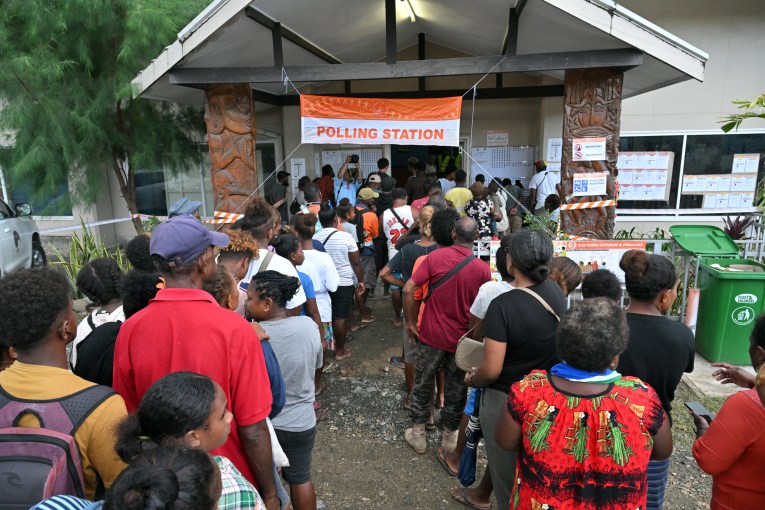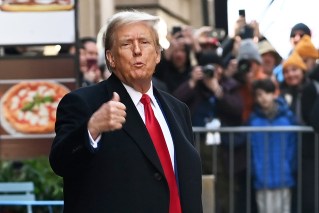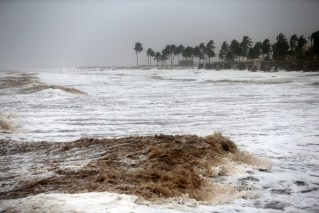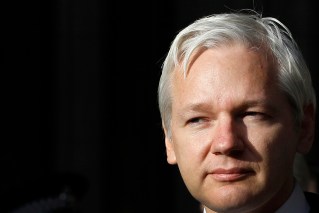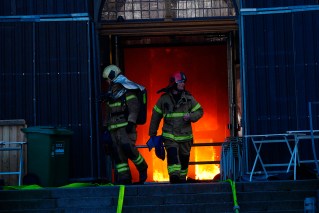Heightened security as Japan’s Emperor makes rare move

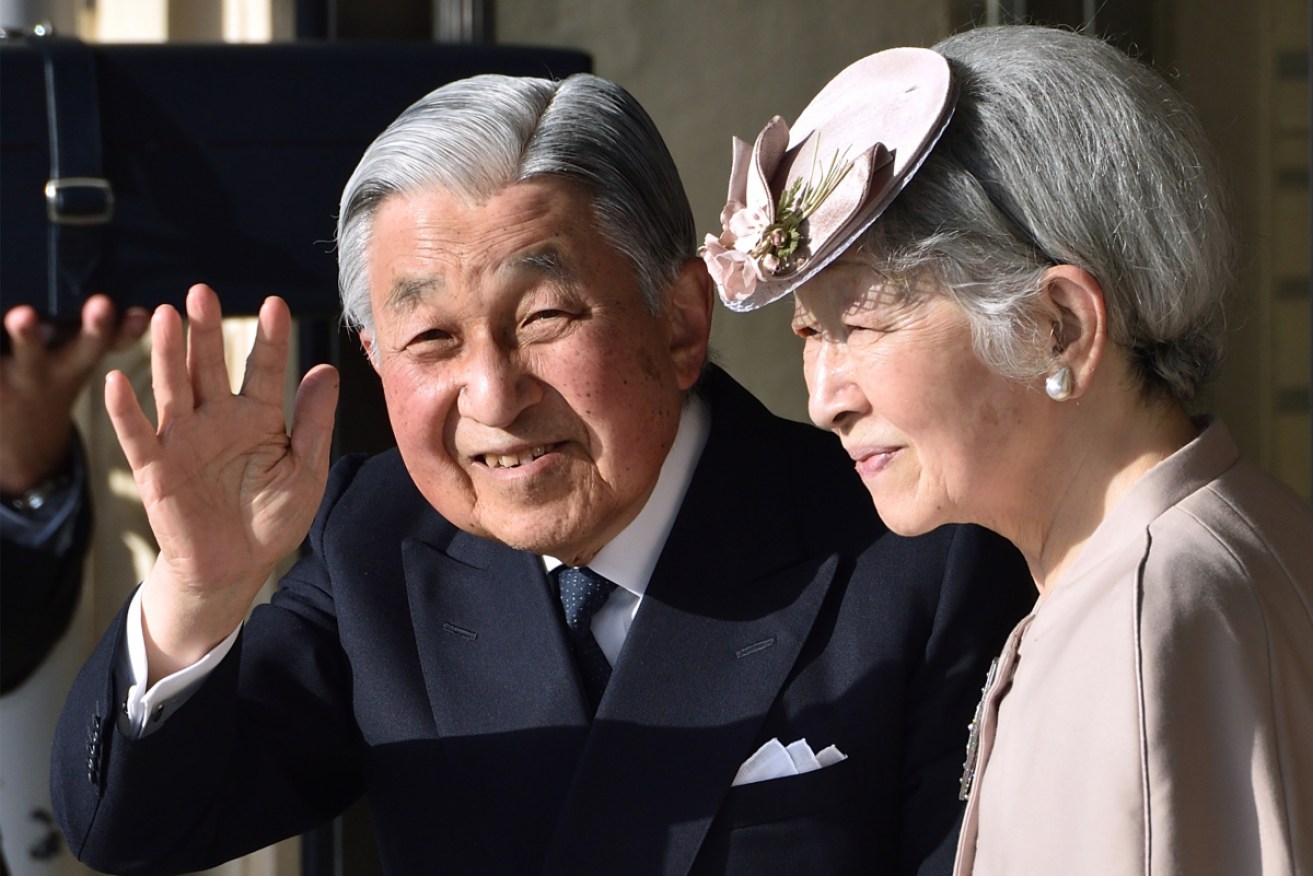
Emperor Akihito and Empress Michiko wave to well-wishers in Ise in central Japan in April. Photo: Getty
Security checks are under way by divers in the moats around the Imperial Palace in Tokyo as authorities remain on alert for threats to the beginning of a ‘new era’ for Japan.
Tuesday marks a rare historical event in modern history when Emperor Akihito becomes the first Japanese monarch in more than 200 years to abdicate the throne.
But unlike the fanfare the world has come to expect at European and British palaces during official events, the abdication of the head of the Imperial Family is expected to be a comparatively simple affair.
Only about 300 people – including relatives, court judges and politicians – will attend the ceremony at the Imperial Palace, though it will be televised around the country and outside the palace there are celebrations for 10 days of “Golden Week”.
The Emperor’s son Naruhito will join his father, and mother Empress Michiko, for the ceremony on Tuesday. He is expected to formally take over the throne the following day.

Security checks outside the Imperial Palace. Photo: Getty
The unusual end of an era
In Japan, the Emperor is forbidden to actively influence Japanese politics. It is expected that an Emperor serves in his role until he passes away, so the upcoming abdication is very unusual.
Emperor Akihito signalled three years ago his desire to step down, citing fears his age and ailing health threatened his ability to serve the country.
But political experts have questioned the timing of the abdication and the reasons behind the move.
It comes at a time that Japan is being ruled by an ultra-conservative government led by Prime Minister Shinzo Abe, who has expressed a desire to move away from the current pacifist Constitution which calls for a renunciation of war.
Benjamin Ascione, research fellow at Crawford School of Public Policy at Australian National University explained it was extremely rare for an emperor to address the nation as he did in 2016.
“Akihito is seen by many to have liberal leanings that contradict the Abe government,” Mr Ascione said.
“In his address he referred to his role as a symbol. He used that term about once a minute. Some interpret that as a push back against the current Abe administration, which is currently looking to revise the Constitution and make changes to the role of the emperor, possibly making it a more active role.”
Japanese literary critic and professor at Waseda University, Norihiro Kato, wrote in The New York Times that the emperor’s address to the people was a bold move, “the first time since 1945 that an emperor has gone over the government’s head”.
The professor wrote: “The more persuasive interpretation, to my mind, is that Emperor Akihito has been so deeply disturbed by the Abe administration’s efforts to transform the Constitution – not only to politicise the role of the emperor, but also to dispense with the so-called peace clause that prohibits Japan from engaging in war – that he is trying to delay their progress”.

Emperor Akihito and Empress Michiko receive bouquets from scouts after a memorial ceremony in commemoration of the 30th anniversary of the Emperor’s accession to the throne on February 24. Photo: Getty
The start of the ‘Reiwa’ imperial era
The imperial era name, known as “gengo”, is the way Japanese count years – a system imported from China more than 1000 years ago.
The era, specified on documents and coins, changes when a new emperor takes the throne. So far there has been 247 eras.
The selection of the imperial name was top secret, and there was much media hype, until the official reveal at the start of April.
For the first time, the name was chosen from two characters from an ancient Japanese poetry book, breaking with the tradition of using two characters from Chinese classic literature.
The move caused some confusion over the meaning of the name, with the characters having different meanings, and the government slow to provide an official interpretation.
In the context of the poem the characters were taken from, the name could mean “fortune”, “harmony” or “peace”.
But many Japanese were quick to point out it could be interpreted as “order” or “command”.
The government later clarified the name was not meant to be about law or order.
“Like the plum flowers that beautifully bloom, heralding the arrival of spring after a severe winter, each one of the Japanese people can bloom their own flowers with a hope for tomorrow,” Prime Minister Abe said.
Political commentators see the move away from Chinese characters as a reflection of Mr Abe’s ultra-conservative government’s attempt to bolster national pride.
The new era begins on Wednesday when Crown Prince Naruhito ascends the Chrysanthemum Throne a day after the abdication of his father brings to an end the 31-year Heisei era.

Emperor Akihito is renouncing the throne. Photo: Kimimasa Mayama
Naruhito’s accession to the throne
Akihito, 59, was educated at Oxford. He is married to Masako, a Harvard-educated former diplomat. He is the eldest of the Emperor’s two sons.
On Wednesday, special objects including seals, a sword and a jewel will be placed on a desk in front of the new emperor as proof of his rightful succession.

Japan’s Crown Prince Naruhito. Photo: Getty
The ceremony will be observed by a small group that includes adult male royalty and representatives of the three branches of the government, including the Prime Minister and his cabinet.
The event is expected to mark another historical moment: It will be the first time a woman has been allowed to attend a succession ceremony.
The ceremony is not open to female royalty, but Satsuki Katayama – the only female minister in cabinet – will be the first woman in modern history to attend.
Security fears for Imperial Palace
Japanese media reported that security would be bolstered at royal residences amid fears for the safety of the Emperor’s grandson Prince Hisahito after reports that two knives were found on the 12-year-old’s school desk.
Police on Monday declined to comment on the report but, according to Kyodo News, security camera footage showed a man disguised as a construction worker enter the grounds of the junior high school in Tokyo.
“We will be enhancing security to prevent illegal behaviour, including terrorism acts, from happening near the palace and the Akasaka Imperial property as well as streets accessing them,” an official said.
Kyodo News said several thousand police officers would be on hand on Thursday when huge crowds of well-wishers are expected to show up to welcome the new Emperor.
-with AAP
